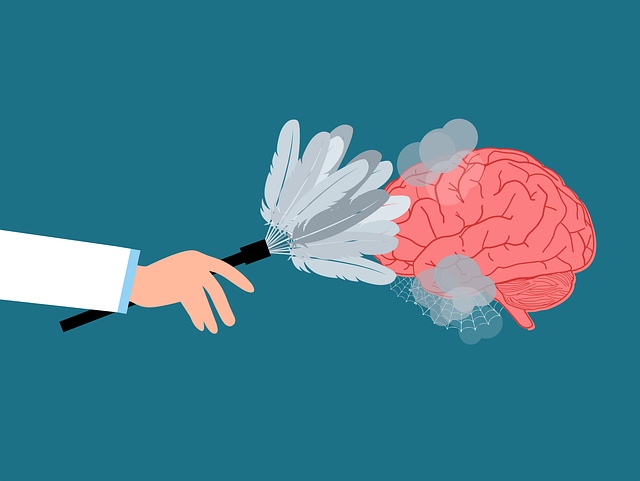Denver Neuro Disorders Therapy leverages comprehensive risk assessment as a cornerstone of its holistic mental health approach. By analyzing patient history, conditions, and environmental factors through detailed questionnaires and interviews, they proactively address vulnerabilities. This enables them to implement evidence-based practices like mindfulness meditation for stress management, prevent depression, and build resilience. The ultimate goal is to empower clients with improved emotional intelligence, positive mental health outcomes, and a safe space to navigate their journeys, maintaining the highest care standards under continuous risk assessment reviews.
Mental health professionals constantly navigate complex risks, making effective risk management planning crucial. This article explores strategies tailored for practitioners, focusing on the unique challenges presented by mental health care. We delve into understanding risk within this context, highlighting case studies from Denver Neuro Disorders Therapy—a bustling hub known for its innovative practices. Key sections cover assessing risks, crafting comprehensive plans, implementing safe-care strategies, and monitoring their effectiveness. By learning from diverse approaches, professionals can enhance patient safety and foster healthier outcomes.
- Understanding Risk in Mental Health Practice
- Assessing Risks at Denver Neuro Disorders Therapy
- Developing a Comprehensive Risk Management Plan
- Implementing and Monitoring Strategies for Safe Care
Understanding Risk in Mental Health Practice

In the complex landscape of mental health care, understanding risk is paramount for professionals like those at Denver Neuro Disorders Therapy. Risk isn’t merely an abstract concept but a tangible factor that shapes the therapeutic journey. It encompasses various elements such as patient history, diagnosed conditions, and environmental factors that could potentially impact treatment outcomes. For instance, a patient’s past trauma, co-morbidities, or social support network play significant roles in their mental health trajectory.
By recognizing these risks, Denver Neuro Disorders Therapy professionals can tailor interventions to boost confidence, prevent depression, and enhance emotional intelligence—essential tools for managing and overcoming challenges. This proactive approach not only ensures personalized care but also fosters better patient outcomes and a more resilient mindset.
Assessing Risks at Denver Neuro Disorders Therapy

At Denver Neuro Disorders Therapy, risk assessment is a cornerstone of our comprehensive mental health services. We understand that practicing in this field comes with unique challenges and potential hazards, so we’ve developed a meticulous approach to identify and mitigate risks effectively. Our experts employ various tools and techniques, including detailed patient intake questionnaires and clinical interviews, to gain insights into individual needs and vulnerabilities. This process allows us to tailor interventions and strategies for each client, focusing on emotional well-being promotion techniques such as mindfulness meditation, which has proven beneficial in managing stress and anxiety.
By conducting thorough risk assessments, Denver Neuro Disorders Therapy ensures a safe and supportive environment. We carefully consider factors like past traumatic experiences, current stressors, and the potential for self-harm or harm to others. This proactive approach enables our mental health professionals to implement appropriate safety plans, offer specialized therapies, and provide ongoing monitoring. Our goal is to foster resilience and promote positive mental health outcomes while upholding the highest standards of care.
Developing a Comprehensive Risk Management Plan

In developing a comprehensive risk management plan, mental health professionals in Denver Neuro Disorders Therapy recognize that their well-being is paramount to delivering effective care. This involves creating a structured framework that encompasses not just clinical risks but also personal and professional stressors. A robust plan includes identifying potential hazards unique to the field, such as complex client cases or high-stress work environments. By proactively assessing these risks, therapists can implement tailored strategies for mitigation, enhancing their resilience and ensuring sustained mental health.
The process should integrate self-care routine development for better mental health, fostering a culture of Mental Health Awareness among practitioners. Regularly reviewing and updating the risk management plan becomes an integral part of professional growth, especially in the context of public awareness campaigns development aimed at destigmatizing mental health issues. This holistic approach ensures that Denver Neuro Disorders Therapy remains at the forefront of providing compassionate and resilient care to its clients.
Implementing and Monitoring Strategies for Safe Care

Implementing effective strategies for safe care is paramount in mental health practice, especially for professionals dealing with complex neurodisorders. At Denver Neuro Disorders Therapy, we recognize that managing risks requires a multifaceted approach. Our strategies encompass a range of techniques designed to enhance patient safety and well-being while fostering a supportive environment. This includes establishing clear protocols for crisis intervention, ensuring access to coping skills development programs, and regularly reviewing and updating risk assessment procedures.
Monitoring these strategies is an ongoing process, crucial for identifying areas of improvement. By closely tracking patient outcomes and feedback, our team can adapt practices to provide optimal care. The goal is not only to mitigate potential risks but also to promote Anxiety Relief and enhance Mental Health Awareness among our clients. Through this comprehensive approach, Denver Neuro Disorders Therapy strives to create a secure and nurturing space for individuals navigating their mental health journeys.
Mental health professionals, like those at Denver Neuro Disorders Therapy, operate in a complex environment where risk management is not just beneficial but essential. By understanding and assessing risks effectively, as demonstrated in this article, therapists can develop robust plans to ensure patient safety. Implementing these strategies not only mitigates potential harms but also fosters a nurturing and secure therapeutic environment. Continuous monitoring allows for dynamic adaptation, ensuring that care remains tailored to individual needs and aligned with best practices. Through proactive risk management, professionals can enhance their practice, improve outcomes, and provide the highest quality of care.














